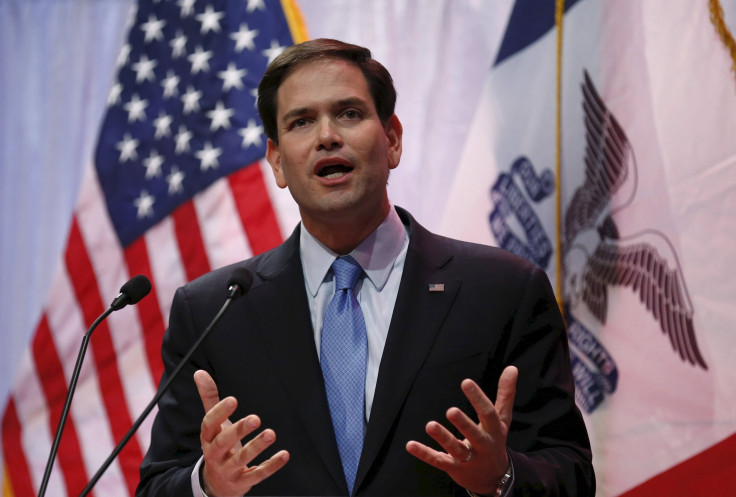Marco Rubio Says He Will 'Absolutely' Reverse US-Cuba Thaw As President

If U.S. voters choose Republican presidential candidate Marco Rubio in 2016, they will also be voting to reverse the historic diplomatic thaw between the United States and Cuba, Rubio said Friday. The remarks come a week after the White House announced the U.S. and Cuba would be reopening embassies in each other’s countries after 50 years of frozen relations.
In an interview with The Guardian, the Florida senator said President Barack Obama’s moves to re-establish ties with the Caribbean nation were in violation of the law, and that he would “absolutely” roll back Obama’s actions if he became president. Rubio also said Obama ignored statutes that required Congressional approval for such action. “As president, I will follow the law,” he said.
Rubio, the son of Cuban immigrants, has long been a critic of Cuba’s Communist government and President Obama’s efforts to resume relations with Cuban President Raúl Castro’s administration. Since Obama and Castro announced the diplomatic thaw in December, high-level officials from both countries have met for four rounds of talks in Havana to hash out terms for reopening the embassies and diplomatic channels. The United States removed Cuba from its list of state sponsors of terrorism in May, which was a key prerequisite for the Castro administration to move forward with the talks. The embassies are set to reopen July 20, the White House said last week.
The moves don’t roll back the longstanding U.S. economic embargo on Cuba, which has been in place since the early 1960s. Only Congress can vote to repeal the embargo, but President Obama has used the thaw to encourage lawmakers to make the move. Rubio told the Guardian that the embargo remained a critical way for the United States to exert pressure on Castro’s government to respect democracy and human rights.
“We could have used, and can use, economic sanctions through the embargo as leverage to gain democratic concessions and openings for the Cuban people in exchange for alleviating some of these conditions, especially the diplomatic recognition and the removal of Cuba from the state sponsor of terrorism list,” Rubio said, arguing that the Obama administration has now lifted pressure off the Cuban government without achieving any of the reforms.
Rubio penned a New York Times op-ed Thursday detailing his views on Cuba. “[O]ur extensive experience with transitions from Communism has shown that economic opening and diplomatic engagement do not automatically lead to political freedom,” he wrote, citing U.S. relations with China and Vietnam as examples.
Rubio’s determination to roll back the thaw, however, doesn’t fall into step with the views of most Americans, studies show. According to a January poll by the Pew Research Center, 63 percent of Americans favor the U.S. re-establishing relations with Cuba, and 66 percent support ending the embargo. Cubans, meanwhile, overwhelmingly support the resumption of relations, according to a survey by Bendixen and Amandi International published in April, which found support for the policy from 97 percent of those polled on the island.
© Copyright IBTimes 2024. All rights reserved.






















